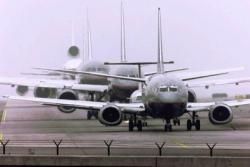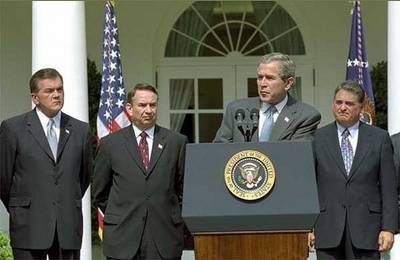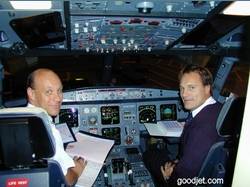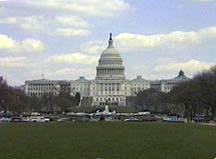But Will Prez Sign It?
 If Congress gets its way, the creeks don't rise
and the President doesn't use his veto pen, airlines mired in the
doldrums of war, terrorism and SARS will get $2.9 billion to ease
their collective pain. Congressional negotiators have reached a
deal.
If Congress gets its way, the creeks don't rise
and the President doesn't use his veto pen, airlines mired in the
doldrums of war, terrorism and SARS will get $2.9 billion to ease
their collective pain. Congressional negotiators have reached a
deal.
Under the plan, reached Friday, the government would provide a
quick-acting cash infusion of $2.4 billion to airlines within 30
days. That will help especially in cases where airlines are heavily
in debt and losing money. The relief package, which includes
unemployment compensation for laid off workers, totals $3.2
billion.
Bush: "Excessive"
Bush administration officials say $3 billion in relief is a bit
much. They said the airline industry already received $15 billion
in federal help after the Sept. 11 attacks and market forces should
determine which airlines survive.
But that argument didn't fly on Capitol Hill. Nor did Lawmakers
heed White House objections to a provision that extends
unemployment insurance for 26 weeks to aviation industry workers
who've lost their jobs since Sept. 11, 2001.

In working out the differences between the House's $3.2 billion
plan and the Senate's $2.7 billion version, negotiators at one
point had whittled proposed unemployment insurance to 13 weeks for
airline workers alone.
But Sen. Arlen Specter (R-PA), and Rep. David Obey (D-WI),
pushed the committee for an extension of unemployment insurance for
26 weeks and the expansion of those benefits to workers for
airlines, airline manufacturers, suppliers and airports.
But Are Airline Execs Making Out Like Bandits?
 Obey argued Congress should do more to help
workers, since negotiators had weakened proposed restrictions on
airline executives' compensation. "If we're going to take such
great care of the CEOs of the airlines in this coming amendment, it
seems to me we could be taking a little better care of the
workers," Obey said. The agreement limits the salaries for
airlines' top two executives to 2002 levels, loosening Senate
restrictions that would have capped the compensation of their top
five executives. The compromise also exempts stock and preexisting
retirement contracts from calculations of executive pay. Airlines
that violate the rule would lose their government grants, and the
restrictions don't apply to smaller airlines.
Obey argued Congress should do more to help
workers, since negotiators had weakened proposed restrictions on
airline executives' compensation. "If we're going to take such
great care of the CEOs of the airlines in this coming amendment, it
seems to me we could be taking a little better care of the
workers," Obey said. The agreement limits the salaries for
airlines' top two executives to 2002 levels, loosening Senate
restrictions that would have capped the compensation of their top
five executives. The compromise also exempts stock and preexisting
retirement contracts from calculations of executive pay. Airlines
that violate the rule would lose their government grants, and the
restrictions don't apply to smaller airlines.
Tacked Onto Iraq Supplemental
 Strategy-wise, it would seem Congress has
President Bush over a barrell on this one. The airline relief plan
is part of a supplemental budget to pay for the war in Iraq, which
President Bush most assuredly wants and is likely to sign. Rep.
John Mica (R-FL), chairman of the House aviation subcommittee, said
members of Congress grew more charitable toward the airlines
because the war in Iraq and severe acute respiratory syndrome, or
SARS, have depressed air traffic.
Strategy-wise, it would seem Congress has
President Bush over a barrell on this one. The airline relief plan
is part of a supplemental budget to pay for the war in Iraq, which
President Bush most assuredly wants and is likely to sign. Rep.
John Mica (R-FL), chairman of the House aviation subcommittee, said
members of Congress grew more charitable toward the airlines
because the war in Iraq and severe acute respiratory syndrome, or
SARS, have depressed air traffic.
The $2.4 billion in cash represents reimbursement for security
costs, including $100 million to help pay for the fortified cockpit
doors the airlines had to install by last week. The airlines will
also get a holiday from the passenger security tax of up to $10 per
round-trip between June 1 and Sept. 30. The plan also calls for the
government to extend war-risk insurance for 10 years, which is
estimated to cost the government $605 million beginning in
2004.
Major airlines lost $18 billion since the hijackings because of
terrorism fears, overcapacity, mismanagement and high labor costs,
say airline analysts. Since the war began, airlines announced
10,000 job cuts, according to industry estimates. The airline
industry said it needs at least $4 billion to cover costs for
enhanced security and passenger declines that stemmed from the war
and concerns about terrorism.
 ANN's Daily Aero-Term (04.20.24): Light Gun
ANN's Daily Aero-Term (04.20.24): Light Gun Aero-News: Quote of the Day (04.20.24)
Aero-News: Quote of the Day (04.20.24) ANN's Daily Aero-Linx (04.21.24)
ANN's Daily Aero-Linx (04.21.24) Aero-News: Quote of the Day (04.21.24)
Aero-News: Quote of the Day (04.21.24) ANN's Daily Aero-Term (04.21.24): Aircraft Conflict
ANN's Daily Aero-Term (04.21.24): Aircraft Conflict






